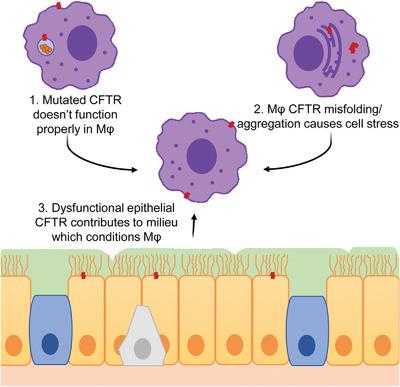当前位置:
X-MOL 学术
›
J. Leukoc. Biol.
›
论文详情
Our official English website, www.x-mol.net, welcomes your feedback! (Note: you will need to create a separate account there.)
Macrophage dysfunction in cystic fibrosis: Nature or nurture?
Journal of Leukocyte Biology ( IF 5.5 ) Pub Date : 2020-07-17 , DOI: 10.1002/jlb.4ru0620-245r Keren B Turton 1 , Rebecca J Ingram 1 , Miguel A Valvano 1
Journal of Leukocyte Biology ( IF 5.5 ) Pub Date : 2020-07-17 , DOI: 10.1002/jlb.4ru0620-245r Keren B Turton 1 , Rebecca J Ingram 1 , Miguel A Valvano 1
Affiliation

|
Mutations in the cystic fibrosis transmembrane conductance regulator (CFTR) affect the homeostasis of chloride flux by epithelial cells. This has deleterious consequences, especially in respiratory epithelia, where the defect results in mucus accumulation distinctive of cystic fibrosis. CFTR is, however, also expressed in phagocytic cells, like macrophages. Immune cells are highly sensitive to conditioning by their environment; thus, CFTR dysfunction in epithelia influences macrophages by affecting the lung milieu, but the mutations also appear to be directly consequential for intrinsic macrophage functions. Particular mutations can alter CFTR's folding, traffic of the protein to the membrane and function. As such, understanding the intrinsic effects of CFTR mutation requires distinguishing the secondary effects of misfolded CFTR on cell stress pathways from the primary defect of CFTR dysfunction/absence. Investigations into CFTR's role in macrophages have exploited various models, each with their own advantages and limitations. This review summarizes these methodologic approaches, discussing their physiological correspondence and highlighting key findings. The controversy surrounding CFTR‐dependent acidification is used as a case study to highlight difficulties in commensurability across model systems. Recent work in macrophage biology, including polarization and host–pathogen interaction studies, brought into the context of CFTR research, offers potential explanations for observed discrepancies between studies. Moreover, the rapid advancement of novel gene editing technologies and new macrophage model systems makes this assessment of the field's models and methodologies timely.
中文翻译:

囊性纤维化中的巨噬细胞功能障碍:先天还是后天?
囊性纤维化跨膜电导调节器 (CFTR) 的突变会影响上皮细胞对氯离子通量的稳态。这具有有害的后果,尤其是在呼吸道上皮细胞中,其中缺陷导致囊性纤维化特有的粘液积聚。然而,CFTR 也在巨噬细胞等吞噬细胞中表达。免疫细胞对其环境的调节高度敏感;因此,上皮细胞的 CFTR 功能障碍通过影响肺环境来影响巨噬细胞,但这些突变似乎也直接影响了巨噬细胞的内在功能。特定的突变可以改变 CFTR 的折叠、蛋白质向膜的运输和功能。像这样,了解 CFTR 突变的内在影响需要将错误折叠的 CFTR 对细胞应激通路的次要影响与 CFTR 功能障碍/缺失的主要缺陷区分开来。对 CFTR 在巨噬细胞中的作用的研究利用了各种模型,每个模型都有自己的优点和局限性。本综述总结了这些方法论方法,讨论了它们的生理对应性并突出了关键发现。围绕 CFTR 依赖性酸化的争议被用作案例研究,以强调模型系统之间的可通性困难。巨噬细胞生物学的最新工作,包括极化和宿主 - 病原体相互作用研究,纳入 CFTR 研究的背景,为观察到的研究之间的差异提供了潜在的解释。而且,
更新日期:2020-07-17
中文翻译:

囊性纤维化中的巨噬细胞功能障碍:先天还是后天?
囊性纤维化跨膜电导调节器 (CFTR) 的突变会影响上皮细胞对氯离子通量的稳态。这具有有害的后果,尤其是在呼吸道上皮细胞中,其中缺陷导致囊性纤维化特有的粘液积聚。然而,CFTR 也在巨噬细胞等吞噬细胞中表达。免疫细胞对其环境的调节高度敏感;因此,上皮细胞的 CFTR 功能障碍通过影响肺环境来影响巨噬细胞,但这些突变似乎也直接影响了巨噬细胞的内在功能。特定的突变可以改变 CFTR 的折叠、蛋白质向膜的运输和功能。像这样,了解 CFTR 突变的内在影响需要将错误折叠的 CFTR 对细胞应激通路的次要影响与 CFTR 功能障碍/缺失的主要缺陷区分开来。对 CFTR 在巨噬细胞中的作用的研究利用了各种模型,每个模型都有自己的优点和局限性。本综述总结了这些方法论方法,讨论了它们的生理对应性并突出了关键发现。围绕 CFTR 依赖性酸化的争议被用作案例研究,以强调模型系统之间的可通性困难。巨噬细胞生物学的最新工作,包括极化和宿主 - 病原体相互作用研究,纳入 CFTR 研究的背景,为观察到的研究之间的差异提供了潜在的解释。而且,



























 京公网安备 11010802027423号
京公网安备 11010802027423号